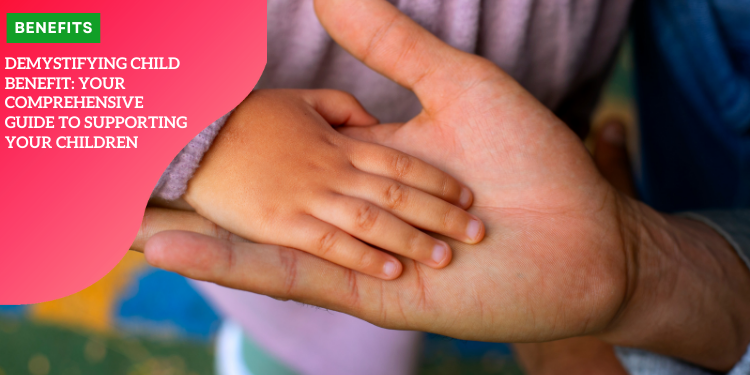Demystifying Child Benefit: Your Comprehensive Guide to Supporting Your Children
Por: Davi Vasconcelos em janeiro 8, 2024 Última atualização em: julho 30, 2024

What is Child Benefit?
Child Benefit is a benefit granted by the UK government to assist with expenses related to children. It is a monthly cash contribution designed to provide ongoing financial support to families, regardless of their income. The benefit aims to help families with the costs associated with raising children, providing financial relief that can be used to cover everyday expenses and ensure a more stable financial situation.
The Child Benefit program is part of the UK’s broader social support system, intended to alleviate some of the financial pressures on families and ensure that all children have access to basic necessities. By offering this support, the government helps families manage the costs of childcare, education, and other essential needs.
Amount paid for each child:
The value of Child Benefit is determined based on the number of children in the family. Currently, the benefit is £21.15 per week for the eldest child and £14 per week for each additional child. While this amount may seem modest individually, its consistency, paid monthly, makes it a valuable resource for everyday expenses related to children. This regular payment can help families budget more effectively and provide a more predictable source of income to cover recurring costs.
The benefit amounts are designed to provide a basic level of support, but they can significantly contribute to managing the financial burden of raising multiple children. This consistent support is particularly helpful for families with lower incomes, as it ensures that every child benefits from some level of financial assistance.
Eligibility: Who can receive Child Benefit?
Eligibility for Child Benefit is broad and comprehensive. All families with children are entitled to the benefit, regardless of their financial situation. There are no income restrictions, making it a universal resource for all families. If you are a parent or guardian of a child, whether biological or adopted, you may qualify to receive Child Benefit.
Child Benefit aims to support those directly involved in caring for children, and there are no restrictions based on marital status or employment status. Even if you or your partner are unemployed, the benefit will continue to be paid, providing crucial financial security. This universality helps ensure that every child has access to basic financial support, regardless of their family’s income level or employment status.
Child Benefit is paid until the child reaches 16 years old. If the child is in full-time education, the benefit will be extended until they turn 20. This extension is particularly beneficial for families with older children who are still in school or undergoing further education, helping to cover the costs associated with their continued development and learning.
How to make your application
Below, we will describe the step-by-step process for you to apply for Child Benefit:
- Fill out the Child Benefit application form. This form is available online on the official UK government website. You can also obtain the form at local service centers or through the mail. The online application process is straightforward and allows for quick submission, while the option to apply by mail or in person provides additional flexibility.
- You will need to provide some documentation to accompany your application. This may include the child’s birth certificate and, for first-time applicants, personal identification information. Ensuring that you have all necessary documents ready will help expedite the application process and prevent delays.
- To receive Child Benefit, you need to have a UK bank account. The benefit is deposited directly into this account, providing an efficient and secure way to receive payments. This direct deposit system helps ensure that payments are timely and reduces the risk of lost or delayed checks.
- It is ideal to apply for the benefit as soon as the child is born or becomes part of your family. However, you can apply at any time, including if your situation changes, such as the arrival of a new family member. Applying early helps ensure that you start receiving the benefit as soon as possible and can assist with managing new expenses that arise with the addition of a child.
Important information to consider:
It’s important to be aware that Child Benefit may be subject to taxes if your income or your partner’s income exceeds certain limits. Make sure to understand these tax implications and plan your finances accordingly. If your income is above the threshold, you may need to repay some or all of the benefit through the High Income Child Benefit Charge, so it’s essential to keep track of your income levels and any potential tax obligations.
If there are changes in your situation, such as a change of address or the addition of children to the family, it is crucial to inform the department responsible for Child Benefit. This ensures that you continue to receive the correct amount and avoids potential administrative issues. Keeping your information up-to-date helps prevent delays in benefit payments and ensures that you receive the full amount you are entitled to.
By fully understanding the application process, eligibility criteria, and other important information, you can ensure that your family makes the most of this essential benefit.
ACCESS GOVERNMENT WEBSITE




